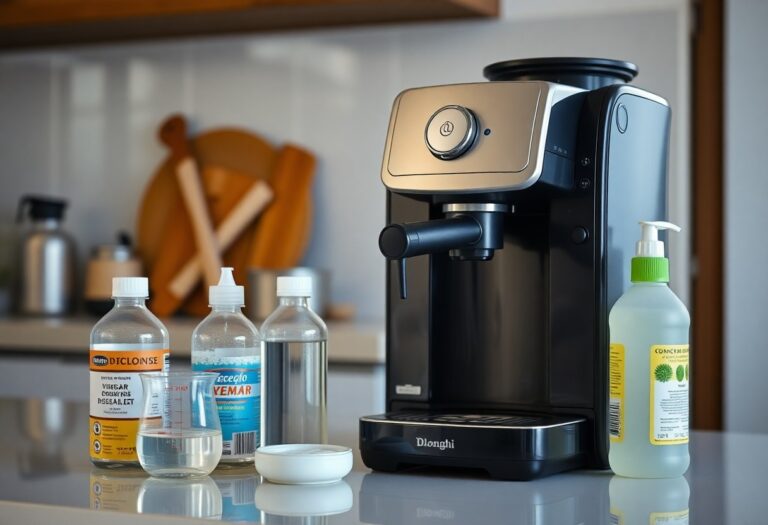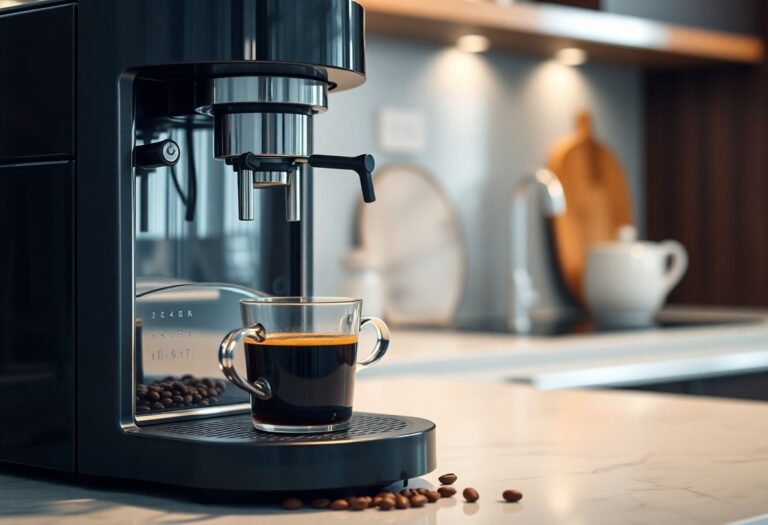What to Clean a Coffee Machine With – Cleaning Products
Just as you enjoy your morning cup of coffee, maintaining your coffee machine is vital for longevity and flavor. Using the right cleaning products not only enhances your coffee experience but also ensures that harmful bacteria and limescale don’t build up inside. In this guide, you’ll discover the most effective cleaning agents, including vinegar, baking soda, and specialized cleaners, to keep your machine in optimal condition. Equip yourself with the knowledge to select the best solutions for your coffee maker and enjoy a cleaner, better brew every time.
Key Takeaways:
- White vinegar is a popular and effective natural cleaner for descaling coffee machines, helping to remove mineral buildup.
- Baking soda can be used for scrubbing and deodorizing parts of the coffee machine, ensuring a fresh aroma in brewed coffee.
- Commercial descaling solutions are available and specifically formulated to clean coffee machines, offering convenience and effective results.
- Regular cleaning of the coffee pot and filter basket with warm soapy water helps maintain proper hygiene and flavor in your coffee.
- Always consult the manufacturer’s instructions before using any cleaning products to avoid damaging your coffee machine.

The Chemistry of Coffee Residue
Coffee residue forms over time from a combination of oils, acids, and minerals present in your brew. These elements not only affect the flavor of your coffee but can also lead to buildup in your machine, potentially hindering its performance. Regular cleaning removes this residue, preserving both the taste of your coffee and the longevity of your machine. For an easy-to-follow guide, check out How To Clean A Coffee Maker The Easy Way.
What Coffee Oils and Minerals Do to Your Machine
The natural oils released during brewing can contribute to a sticky buildup inside your coffee maker. Over time, minerals from hard water can also create limescale deposits, affecting the heating element and other components. This buildup can become a breeding ground for bacteria, compromising the cleanliness of everything that touches your coffee.
Why Regular Cleaning is Crucial for Performance
Cleaning your coffee machine regularly allows for consistent brewing temperatures and flavor profiles. By eliminating residue and mineral deposits, you ensure that each cup is as flavorful as the last, avoiding any unwanted bitterness or off-flavors from old coffee oils. Machines that are well-maintained can even operate more efficiently, saving both time and energy.
Just like any appliance, your coffee machine needs routine attention to maintain its effectiveness. When you neglect cleaning, you’re likely to encounter issues like slower brewing times and an inconsistent taste, which can detract from your coffee experience. A simple cleaning routine can enhance both the performance and the lifespan of your machine, giving you the best cup every time.
The All-Star Cleaning Agents
Cleaning your coffee machine effectively requires using the right products. A blend of natural and store-bought cleaning agents can keep your brew machine spotless and ensure your coffee tastes fresh. Opting for the best cleaning solutions will not only maintain the performance of your coffee maker but also extend its lifespan, making your daily ritual even more enjoyable. Dive into the specifics of both natural cleaners and commercial solutions to find what suits your cleaning routine best.
Natural Cleaners: Vinegar and Baking Soda
If you prefer a natural approach, vinegar and baking soda are your best allies. Vinegar’s acidic properties eliminate mineral buildup and grime effectively, while baking soda acts as a gentle abrasive to tackle stubborn stains. Mix equal parts of vinegar and water for the best results, followed by a rinse cycle with clear water to neutralize the vinegar’s odor.
Store-Bought Solutions: What to Look for in Products
Choosing store-bought cleaning products requires some discernment. Look for cleaners specifically designed for coffee machines, which typically feature ingredients formulated to combat limescale, oils, and coffee stains without damaging the machine’s components. Additionally, opt for eco-friendly options that won’t harm the environment but still provide powerful cleaning. Also, consider products that come with clear instructions for safe use.
When choosing store-bought solutions, check for certifications and ingredients that indicate effectiveness and safety. Products containing citric acid, for example, help break down mineral deposits. Ensure the cleaner is compatible with your coffee machine type—whether it’s a drip coffee maker, espresso machine, or single-serve unit—as some cleaners may be too harsh for certain materials. Reading customer reviews can also provide insights into the product’s performance and ease of use, helping you make an informed choice for your coffee machine maintenance.
Step-by-Step Guide to Cleaning Techniques
| Cleaning Tasks | Frequency |
|---|---|
| Quick Wipe Down | Daily |
| Empty Carafe and Brew Basket | Daily |
| Descaling | Monthly |
| Deep Clean Components (Hoses, Filters) | Monthly |
Daily Maintenance: Quick Wipes and Rinses
Everyday upkeep of your coffee machine involves simple tasks like wiping down the exterior and rinsing the brew basket and carafe. A damp cloth can efficiently remove any coffee splatters, while a quick rinse ensures no old coffee grounds are left behind, which could affect flavor. Establishing this routine will enhance not only the hygiene of your machine but also the taste of each cup you prepare.
Deep Cleaning: A Monthly Approach
Taking a month-to-month approach to deep clean your coffee machine will prolong its life and ensure optimal function. This involves using descaling solutions to eliminate mineral buildup and thoroughly cleaning internal components, like hoses and filters. By addressing these aspects regularly, you can prevent blockages and maintain a consistent coffee flavor.
Deep cleaning involves a few crucial steps beyond regular rinsing and wiping. Start by making a solution of equal parts water and vinegar, or a descaling product designed for coffee makers—preferably one that’s free of harsh chemicals. Run this solution through the machine, then follow with several cycles of plain water to flush it out. Don’t forget to disassemble and wash removable parts like the filter basket and carafe with warm soapy water. This thorough approach will not only keep your coffee machine operating efficiently but will also enhance the taste of your brews by removing any lingering residues.
Eco-Conscious Cleaning Alternatives
Many environmentally friendly cleaning alternatives are available for your coffee machine. Common household items such as distilled white vinegar, baking soda, and citric acid can effectively clean without the harsh effects of traditional chemical cleaners. You can learn more about these eco-conscious options by checking out What can I use to clean my machine as a substitute for ….
The Impact of Chemical Cleaners on the Environment
Chemical cleaners often contain toxic substances that can be harmful to the environment. These chemicals can seep into water systems, posing risks to aquatic life and contaminating drinking water sources. Moreover, the manufacturing processes of these cleaners generate pollution and waste, further contributing to environmental degradation. Choosing eco-friendly alternatives not only protects your health but also helps preserve our planet.
Eco-Friendly Brands to Consider
Several eco-friendly brands now offer effective coffee machine cleaning solutions. Brands like Biokleen and Seventh Generation are committed to sustainability, providing cleaners that are free from harmful chemicals. Method also offers biodegradable products that work efficiently while being gentle on the environment. These brands focus on using plant-based ingredients, ensuring your coffee machine stays clean without compromising your commitment to being eco-conscious.
When choosing an eco-friendly cleaning product, consider options from reputable brands that prioritize environmental safety. For instance, Ecover specializes in biodegradable formulas that clean effectively without the harmful side effects of traditional cleaners. Products like these offer assurance that you can maintain a clean coffee machine while also being mindful of your ecological footprint. Investing in these alternatives not only promotes a greener lifestyle but also supports companies working towards a healthier planet.

Common Myths About Coffee Machine Cleaning
Misunderstandings about how to clean coffee machines often lead to less effective cleaning practices, impacting your coffee’s flavor and the longevity of your machine. Common myths can misguide you, making it seem simpler than it truly is or scaring you away from effective cleaning solutions. Let’s debunk a couple of these myths to help you better maintain your coffee-making equipment.
Debunking Myth #1: Only Hot Water is Sufficient
Believing that hot water alone can sanitize your coffee machine is a misconception that can leave behind mineral deposits and oils. While hot water can effectively loosen grime, it does not remove the built-up residue that can affect both the taste of your coffee and the machine’s efficiency. A comprehensive cleaning routine should include appropriate cleaners to thoroughly address these concerns.
Debunking Myth #2: Vinegar is Too Harsh
Some may avoid vinegar due to fears that it could damage their coffee machine. In reality, vinegar is an effective and natural cleaning agent that breaks down hard water deposits and oils without harming your machine. Used in moderation, it can be a safe choice to maintain your coffee maker’s function and flavor.
The idea that vinegar is too harsh is often exaggerated. In fact, many coffee enthusiasts favor vinegar for its ability to effortlessly dissolve mineral buildup while being gentle on machine components. It’s important to dilute vinegar with water, typically a 1:1 ratio, to ensure a safe cleaning process. Additionally, running a couple of cycles with plain water afterward will eliminate any lingering odor, leaving your machine clean and ready for freshly brewed coffee.
Conclusion
Now that you know what to clean a coffee machine with, you can effectively maintain your appliance to ensure great-tasting coffee. By using a combination of vinegar, baking soda, and specialized coffee machine cleaners, you can remove build-up and keep your machine in top condition. Regular cleaning not only enhances the flavor of your brews but also extends the life of your coffee maker. Make it a habit to clean your machine consistently, and enjoy better coffee every day.
FAQ
Q: What types of cleaning products can I use to clean my coffee machine?
A: You can use a variety of cleaning products to clean your coffee machine. Common options include vinegar, baking soda, citric acid, and commercial coffee machine cleaners. Vinegar is a natural deodorizer and descaler, while baking soda can help remove stubborn stains. Citric acid is effective for descaling and can also enhance the cleaning process of your machine. Commercial cleaners are specifically formulated for coffee makers and often come with clear instructions for use.
Q: How often should I clean my coffee machine with cleaning products?
A: It’s recommended to clean your coffee machine with cleaning products at least once a month. However, if you use your coffee maker frequently, consider cleaning it every 2-3 weeks. Regular cleaning helps maintain the flavor of your coffee and prevents mineral buildup that can affect the machine’s performance.
Q: Can I use bleach or other harsh chemicals to clean my coffee machine?
A: It is not advisable to use bleach or harsh chemicals to clean your coffee machine. These substances can leave toxic residues that may affect the taste of your coffee and pose health risks. Instead, opt for milder cleaning agents like vinegar, baking soda, or specialized coffee machine cleaners that are safe for food equipment.
Q: How do I clean the interior components of my coffee machine?
A: To clean the interior components of your coffee machine, begin by emptying the water reservoir and removing any removable parts, like the filter basket and carafe. Wash these parts in warm, soapy water, and rinse them thoroughly. For the interior, run a mixture of equal parts vinegar and water through the brewing cycle. After that, run a few cycles of clean water to eliminate any vinegar residue before brewing your next coffee.
Q: Are there any cleaning tips for maintaining my coffee machine between deep cleans?
A: Yes, there are several maintenance tips you can follow to keep your coffee machine in good condition between deep cleans. Rinse the carafe and filter basket after each use and allow them to dry completely. Also, regularly check and refill the water reservoir with fresh water. If your coffee machine has a charcoal filter, replace it according to the manufacturer’s recommendations. Wipe down the exterior of the machine with a damp cloth to remove any coffee splatters or stains.







